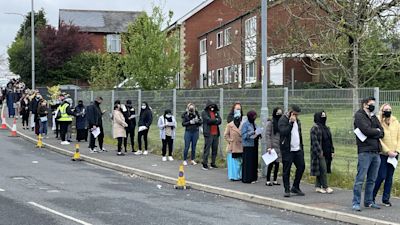Covid-19 hotspots in Bolton and Blackburn 'driven by younger age groups'

Easing of restrictions has gone ahead despite concerns about the spread of the Indian variant in Bolton and Blackburn.
Surge testing is continuing and the vaccination programme has been expanded in a bid to control the rise in cases.
Bolton and Blackburn with Darwen, along with Bedford, are currently recording the highest Covid-19 rates in the UK, with the spread of the Indian variant of coronavirus driving a steep increase in cases.
But in each of those areas, case rates among younger people are running at a much higher level than those for older age groups, according to analysis of the latest data by the PA news agency.
Prof Tom Soloman said it is believed the only people who ended up in hospital this weekend are those who have not had any vaccination.
Bolton recorded 733 new cases of Covid-19 in the seven days to May 11, the latest data shows.
This is the equivalent of 254.9 cases per 100,000 people - the highest anywhere in the UK and the highest for the area since February 12, up sharply from 99.8 per 100,000 one week earlier.
The rate of new cases among people in Bolton aged 60 and over is just 59.9, however.
This is up only slightly from 35.3 a week earlier.
By contrast, the rate for those aged 10-19 in Bolton currently stands at 486.2 per 100,000, up sharply from 200.7 one week earlier, while for those aged 20-29 the rate has jumped from 147.9 to 310.0.
It means the rate in Bolton among 10-19 year-olds is more than eight times the rate for people 60 and over.
Blackburn with Darwen in Lancashire has the third highest rate in the UK, with 118.2 cases per 100,000 people for the seven days to May 11.
This is up from 64.1 one week earlier, and is the highest for the area since March 13.
Once again, the headline numbers conceal big differences in rates between age groups.
For people aged 60 and over the rate is currently 51.0, up from 27.2 a week earlier.
But for 10-19 year-olds the rate stands at 211.4, up from 86.5, and for 20-29 year-olds it is 130.9, up from 104.8.
In all three areas of the country, it is possible to see the impact of the vaccine rollout on the latest spread of the virus.
People aged 60 and over are recording rates which, though they have increased slightly in recent days, remain at a very low level - and it is these people who are most likely to have been offered one, if not both, doses of vaccine.
A majority of people in the younger age groups are unlikely to have been offered a first dose.
Vaccine hesitancy among certain population groups might also be a factor in helping to spread the virus, however.
As of May 9, an estimated 75.2% of people 60 and over in Bolton were likely to have been fully vaccinated, along with 74.3% in Blackburn with Darwen.
When ranking local authorities in England by the proportion of over-60s fully vaccinated, all three areas are in the bottom half of the table.
Speaking to BBC Breakfast on Monday, Dr Helen Wall, who is leading the vaccination effort in Bolton, said there were about 10,000 people in the area in the highest priority groups, those deemed to be clinically vulnerable and the over-50s, who were yet to be vaccinated.
"I'm hoping that we've made a big dent into that now," she said, noting that more than 6,200 vaccines were administered in the area over the weekend.
Vaccination hubs in Bolton were "seeing people coming forward that clearly had the option to have the jab for some time - older people, disabled people - and they've chosen to come forward now," Dr Wall added.
Dominic Harrison, director of public health for Blackburn with Darwen, said the council had been given "the green light" to increase vaccinations in the area, tweeting on Sunday there would be "an additional supply of over 1,000 [doses] per day for the next two weeks for both high variant-spread areas and all residents over 18, subject to eligibility."